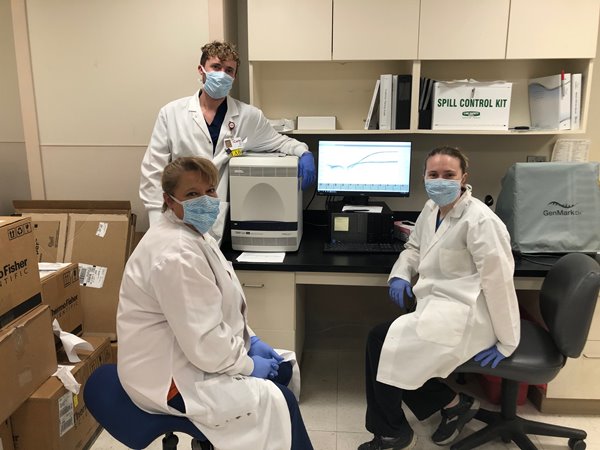Carle Laboratory & Pathology Services quickly repurposed equipment and utilized community partnerships to acquire supplies and personnel to ramp up local COVID-19 testing.
By now, none of us are immune to the effects of COVID-19 on our daily lives – at work and at home. The new reality has departments and teams working in new or modified ways all united around one thing – caring for patients.
It remains Carle’s top priority to best care for our community by promptly identifying the COVID-19 virus while minimizing exposure to others. And our teams have answered that call with force.
Carle Laboratory & Pathology Services teams acted quickly to retool and repurpose their equipment to meet the needs of our community.
During Medical Laboratory Professionals Week, we celebrate those playing a critical role in the fight to contain the virus that causes COVID-19.
First, Carle participated in a statewide public health sentinel, or community surveillance, testing study that included patients of Carle Foundation Hospital Emergency Department who had a negative influenza test. In two weeks, we collected 53 samples to process at state labs as part of the study.
“Just a handful of sites selected helped us better understand how widespread the virus was and guided public health strategies,” said Robert Healy, MD, chief Quality officer.
Just two weeks later, the lab expanded its capability to process collected samples on site, drastically reducing the response time from as long as 14 days to results in just 24 hours.
Dr. Healy said prompt results means patients and physicians have answers sooner to determine appropriate care and reduces strain on state and commercial labs.
Planning for on-site testing began even before there were confirmed cases in the region.
Alastair Dunnett, director of Laboratory Services said he worked with The University of Illinois to obtain supplies and staff to assist to meet the rising demand.
“While Carle had the ability and expertise to test within our lab, it’s not on the scale was necessary for the region’s level of COVID-19 community spread,” he said.
Being a Clinical Laboratory Improvement Amendments (CLIA) Certified lab placed Carle in a very strong position to start but the partnership allowed us to move quickly.
Before the pandemic, just two lab technicians were skilled in this type of test but with training, the team now has more than 10 staff who can operate in three shifts to process hundreds of tests a day.
Prompt results can ease patients’ minds and help control the spread but a negative result doesn’t necessarily mean all clear.
“A negative result doesn’t mean you can’t contract the virus later and you may be able to spread it before you have symptoms,” Dr. Healy said. “It’s not a free pass to relax the measures in place. Everyone should still stay home as much as possible and wear a fabric mask in public to slow the spread of germs.”
Today we’re able to meet system wide needs and support our local and state partners too. The Carle lab processes collected samples from OSF, Christie and McKinley patients as well as those of symptomatic healthcare, public health and first responders to more quickly identify if workers are infected.
But the team’s work continues.
The Food and Drug Administration (FDA) supports a national Expanded Access Program to collect and provide convalescent plasma to patients across the country to treat COVID-19 patients.
Carle is serving as a convalescent plasma use site working collaboratively with Mayo Clinic and Community Blood Services of Illinois to provide an investigational treatment option to critically ill patients who meet certain criteria.
“Our first dose of plasma collected by individuals who have recovered from COVID-19 has been collected by our blood services partner. They worked tirelessly to bring this to the community in record time,” said Bruce Wellman, MD, medical director of Carle’s blood bank and consulting medical director for Community Blood Services in Urbana. “Over the coming weeks we’ll build an inventory so that our region will have access to this potentially lifesaving product.”
Categories: Culture of Quality
Tags: coronavirus, COVID-19, innovation, lab, partnership, quality, services, University of Illinois
